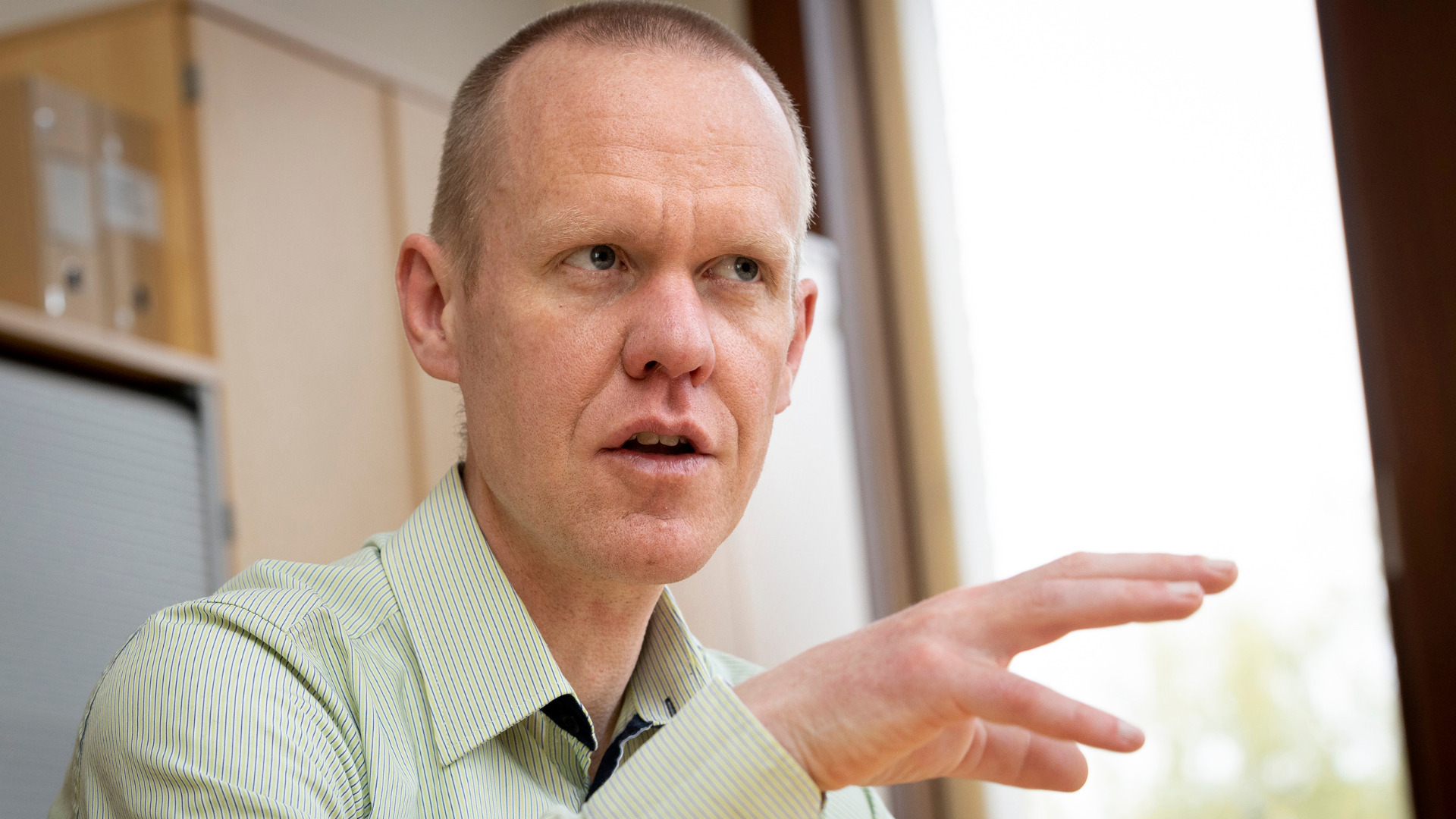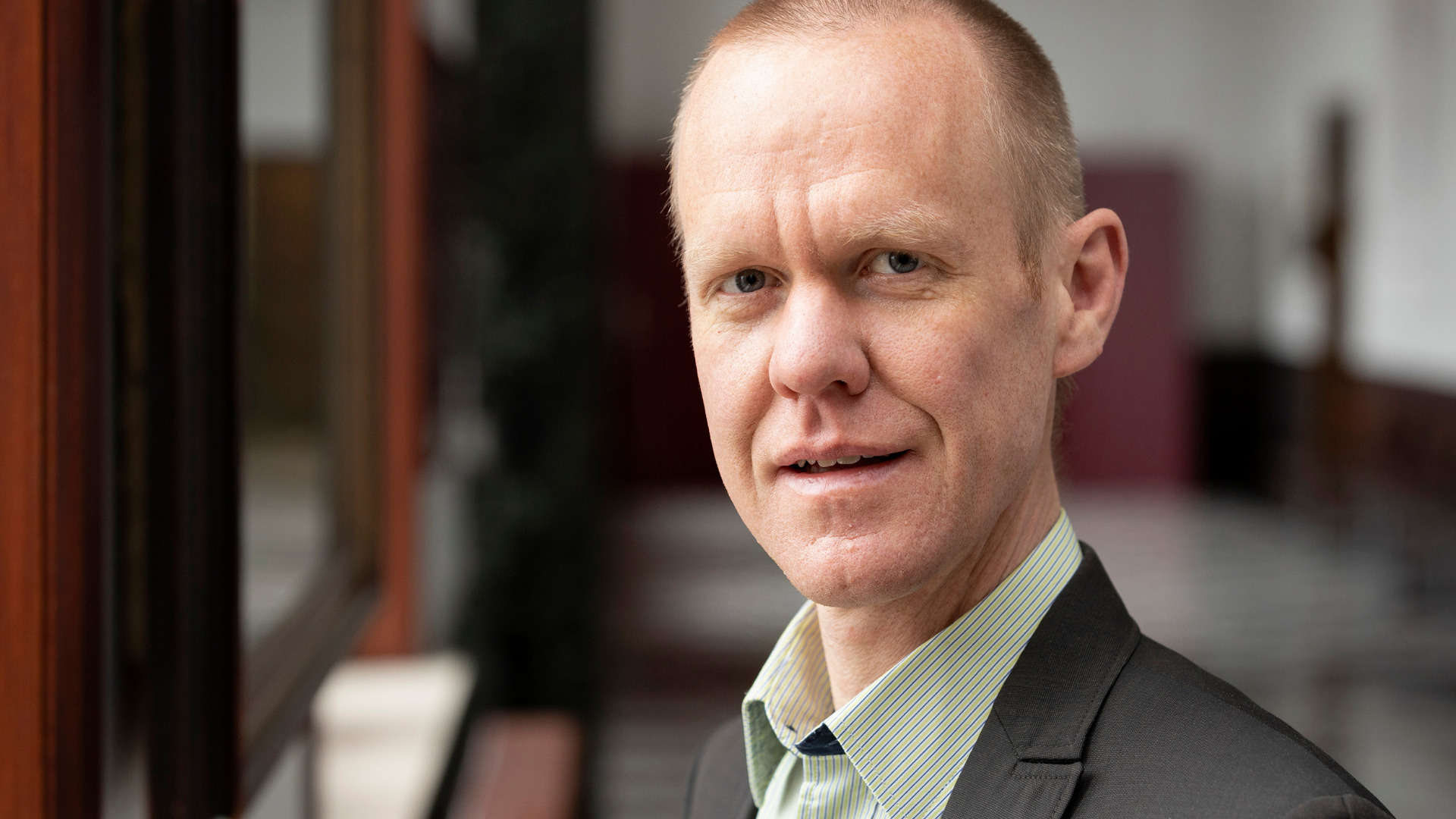The Department of Research & Innovation (ADOC) has a new name: say hello to Research Innovation & Valorisation Antwerp, or RIVA for short. This rebranding includes an updated mission statement and a fresh set of ambitions. ‘In a period of growth, you have to make sure you grow in the right way’, says its head of department, Tim Engels.
The old abbreviation ADOC harked back to the original name of the Research Department at the time of the merger, where the C stood for Coordination. ‘Seven years ago, the name was changed to Research & Innovation, which better reflected what we do. But the old abbreviation lingered on’, explains head of department Tim Engels.
What brought about the decision to change the name of the department again?
Tim Engels: ‘It’s really the culmination of a long process. In recent years, our university has made great strides in terms of innovation and research, but definitely also in terms of valorisation. In periods like that, it’s important to grow in the right way, and in a sustainable way. So over the past two years — with the coronavirus pandemic slowing everything down — we’ve thoroughly reviewed the way we work. What is it exactly that we do, why do we do it, and how do we do it? While we were at it, we also updated our mission statement: our department wants to contribute to a strong, research-intensive and enterprising university with international appeal. And ultimately we realised that our name no longer matched our current activities, mission and ambitions. So we settled on a new name, Research Innovation & Valorisation Antwerp, or RIVA for short.’
How did you come up with that particular name?
Tim Engels: ‘We added V for valorisation because achieving socioeconomic impact has become much more important. We also deliberately chose a name in English to appeal to an international audience, as more and more of our researchers come from different countries. Among our PhD students, this share even exceeds 40 per cent. Our Antwerp Doctoral School also has great international appeal. Finally, we also felt it was important to include our location in the name, so A is for Antwerp.’
‘DRIVERS stands for Development & training, Reporting & analysis, Information, advice & solutions, Visibility & impact, Expanding opportunities, Reaching out, and Safeguarding compliance. Everything we do is connected to those DRIVERS, to ensure we send a clear message to all researchers and colleagues.’
Tim Engels
Can you briefly introduce RIVA?
Tim Engels: ‘For starters, RIVA encompasses the Antwerp Doctoral School, which coordinates all policies concerning doctoral study programmes. Then there’s the Research Affairs Office, which is in charge of research evaluation, bibliometrics, ethics, integrity, data management, the University Research Fund and the Research Board. A third pillar is our Grants Office, which informs, advises and trains people with a view to securing external funding. And finally, there’s the Valorisation Office, which helps researchers to ensure their work has socioeconomic impact, whether it’s through cooperation with companies or by establishing spin-offs. The Valorisation Office also works as one team with the colleagues of the Innovation & Ecosystems Hub at Antwerp Valorisation & Development.’
You’ve also come up with an acronym to sum up the different things you do: DRIVERS. What does that stand for?
Tim Engels: ‘DRIVERS stands for Development & training, Reporting & analysis, Information, advice & solutions, Visibility & impact, Expanding opportunities, Reaching out, and Safeguarding compliance. Everything we do is connected to those DRIVERS, to ensure we send a clear message to all researchers and colleagues. Our information provision activity is particularly visible, as our Grants Office regularly sends out information on research funding and advises researchers on a daily basis on how to raise external funding. But what’s less known is that we also help to manage ethical advice and data management processes, for instance. Before the start of any research project that involves humans or lab animals, certain ethical requirements have to be met. That’s where the S for ‘Safeguarding compliance’ comes in. The DRIVERS provide a framework that connects and supports all of our different activities, and not just to the outside world: everyone working at our department can link what they do to these DRIVERS.’
How important is the V for ‘Visibility & impact’, right in the middle of ‘DRIVERS’?
Tim Engels: ‘It’s very important, and I do mean visibility and impact in the broad sense, so also capitalising on experience later on in one’s career, and sharing knowledge and technology with companies and stakeholders. And it’s not just one of our pillars: it’s one of our university’s overarching goals, as well. The university is actually doing very well in that area. Last year, seven companies were founded thanks to knowledge developed at our university, we were ranked among the top 10 patent-requesting bodies in Belgium, and our private-sector revenues increased by 20 per cent year-on-year.’
What does E for ‘Expanding opportunities’ encompass?
Tim Engels: ‘As a department, we always try to facilitate as many new opportunities as possible: we want to enable access to funding channels that the university or the specific researcher has no previous experience with, we strive to initiate new opportunities for cooperation within YUFE [Young Universities for the Future of Europe], we negotiate with multinationals, we help position our university as an attractive place for young researchers … the list goes on. Such aspects are not always obvious to researchers, and as a department we proactively work to make things happen.

For PhD students, there’s a wide range of training opportunities, from research methods and the acquisition of funding to marketing, developing intercultural skills, and so on. This also links back to the first letter, D for Development & training, which includes not only the doctoral study programme itself, but also various programmes such as Dive-into-Projects, Dive-into-Business and Dive-into-PhD. We offer this type of training year-round.’
What about ‘Reaching out’? What does that entail exactly?
Tim Engels: ‘It’s also about cooperation, but in a different way. We cooperate with other Flemish knowledge institutions on EU policy, knowledge security, human rights and open science, but also with colleagues who support research in a research group or at a faculty. In our recent FWO campaign, for instance, they played a major role in fine-tuning the projects to be submitted. We also cooperate intensively with other organisations, from companies and spearhead clusters to public and non-profit organisations. A great example is the Antwerp Innovation Night, which we recently organised for the second time, together with VOKA Antwerp-Waasland.’
What about the activities that don’t involve the researchers directly?
Tim Engels: ‘Indeed, some of our work is less visible, like the many activities under Reporting & analysis. We report to the government on everything related to research, innovation and valorisation, and we also continuously analyse our own activities. These are important tasks for RIVA, and the researchers do contribute to this pillar as well, for instance when they enter their project data in the Antigoon research database.’
‘The V in DRIVERS stands for visibility and impact. That’s very important, and I do mean visibility and impact in the broad sense. And it’s not just one of our pillars: it’s one of our university’s overarching goals, as well. The university is actually doing very well in that area.’
Tim Engels
Do you work together with other departments?
Tim Engels: ‘We work closely together with almost all other departments: Finance, HR, ICT, Internationalisation, Education, Library … and of course also with the faculties and the research groups.’
Do the new name and mission come with an information campaign?
Tim Engels: ‘Yes, we’ll be stepping up communication about this in the coming months. We’re going to put together an extensive slide deck and ask the faculties to have our management team over for a chat. Not so much to go into detail about everything we do, but rather to clarify mutual expectations. Our mission and the DRIVERS will be the common thread in all this. At a later stage, we also want to discuss our mission and our work with several important external partners, including strategic research centres like Flanders Make, IMEC and VIB. That’s probably something we’ll get to by autumn.’


